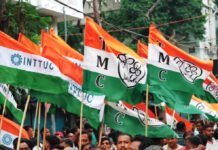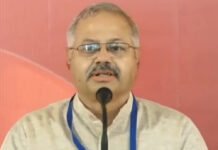Today marks a pivotal day for Sri Lanka, as the nation embarks on a significant presidential election process. This is the first election since the 2022 economic crisis, which deeply shook the country’s political landscape and caused widespread public unrest. With 38 candidates vying for the presidency, the contest has garnered global attention, as it is expected to define the future of a nation still recovering from its worst economic collapse in decades.
Voting Begins Amidst Uncertainty
As of today, voting has officially commenced across 13,400 polling stations throughout Sri Lanka. The elections, set from 7 AM to 5 PM, will see over 1.7 crore registered voters casting their ballots. This election follows an era of turbulence that culminated in the ousting of the former President Gotabaya Rajapaksa. Voters are eager to see whether the leadership of the current President, Ranil Wickremesinghe, will extend beyond his interim tenure or if a new face will assume the highest office in the land.
Sri Lankans are not only voting for a president but are also expressing their hopes for stability after a chaotic period of economic downfall and political upheaval. The results of this highly anticipated election will be declared on Sunday, setting the stage for the next phase of Sri Lanka’s recovery.
The Major Players in Sri Lanka’s 2024 Presidential Election
This election is particularly crucial, with three key figures at the forefront of the race:
Ranil Wickremesinghe: The Incumbent
Ranil Wickremesinghe, 75, currently serves as the nation’s president, having taken over after Rajapaksa fled the country in 2022. With his long political career, Wickremesinghe has faced both praise and criticism for his handling of Sri Lanka’s economic recovery. Having been elected by Parliament to finish the remainder of Rajapaksa’s term, Wickremesinghe’s governance has seen efforts to stabilize the economy and manage public unrest. However, his critics argue that the reforms have been slow, leaving widespread dissatisfaction lingering among the populace.
Sajith Premadasa: The Opposition Leader
The main challenger to Wickremesinghe is Sajith Premadasa, leader of the opposition and head of the Samagi Jana Balawegaya (SJB). Premadasa, son of former President Ranasinghe Premadasa, is positioning himself as a reformer capable of restoring economic prosperity while addressing social inequality. He has garnered significant support from youth and urban voters, who have been particularly affected by the economic crisis. Premadasa’s platform focuses on alleviating poverty, rebuilding the country’s infrastructure, and introducing progressive economic policies to tackle the lingering recession.
Anura Kumara Dissanayake: The Leftist Candidate
The third major contender is Anura Kumara Dissanayake, a prominent figure on the left and leader of the Janatha Vimukthi Peramuna (JVP). Dissanayake is a long-time advocate for social justice and anti-corruption measures and presents himself as the candidate for systemic change. His platform resonates with those frustrated by both major political factions, as he proposes radical reforms to dismantle the deeply entrenched political elites and reset Sri Lanka’s economic trajectory.
Post-Crisis Sri Lanka: What’s at Stake?
The 2024 presidential election marks the beginning of a new chapter for Sri Lanka, but it is also a test of whether the country can rebuild itself politically and economically. The economic recession of 2022 was the worst in Sri Lanka’s history, characterized by soaring inflation, fuel shortages, and a devaluation of the Sri Lankan rupee. These conditions led to massive protests that culminated in the resignation of Rajapaksa and a temporary halt to political life.
This election will determine if Sri Lanka can restore public trust in governance after the perceived mishandling of the crisis. Voters are seeking leadership that can not only manage the lingering economic downturn but also ensure transparency, accountability, and long-term reforms to prevent another collapse.
The Economic Crisis of 2022: A Turning Point
The roots of Sri Lanka’s current economic crisis can be traced back to a series of poor financial decisions, exacerbated by external factors such as the COVID-19 pandemic. The government’s reliance on foreign loans, mismanagement of public funds, and reduced tax revenues created a perfect storm. By 2022, Sri Lanka faced massive shortages of essential goods, forcing citizens to wait in long lines for fuel, food, and medicine.
The government’s decision to default on its foreign debt in April 2022, for the first time in its history, sent shockwaves through international markets. This event, combined with rampant inflation, led to the widespread protests that ultimately forced President Gotabaya Rajapaksa to flee the country and later resign.
Ranil Wickremesinghe’s Interim Leadership
In the wake of Rajapaksa’s departure, Ranil Wickremesinghe was appointed as the interim president, tasked with steering the country through one of its most challenging periods. Since taking office, Wickremesinghe has focused on securing international financial assistance from organizations like the International Monetary Fund (IMF) to stabilize the economy. He has also worked on debt restructuring deals to provide some relief to Sri Lanka’s overwhelmed financial system.
However, Wickremesinghe’s leadership has not been without controversy. Many citizens believe his measures have been insufficient to alleviate their daily struggles. While Sri Lanka has seen some improvement in fuel and food supply chains, the scars of the economic collapse remain fresh in the minds of voters.
A High-Stakes Election
This election stands as a critical crossroads for Sri Lanka. The nation’s choice of leader will impact not only its economic recovery but also its position on the global stage. The international community is closely watching, with nations like India, China, and the United States all having strategic interests in Sri Lanka’s stability. The island nation’s location in the Indian Ocean makes it a vital player in regional geopolitics.
Whoever wins the presidency will face the herculean task of balancing domestic economic reforms with foreign diplomatic relations. The next administration must focus on restoring investor confidence, rebuilding public institutions, and addressing the immediate needs of the Sri Lankan people.
Looking Ahead: Sunday’s Election Results
The outcome of Sunday’s election will reveal the future direction of Sri Lankan politics. Will Wickremesinghe secure a mandate to continue his efforts, or will Premadasa or Dissanayake bring about a shift in leadership? Regardless of the victor, the next president must confront the lingering challenges of inflation, unemployment, and a nation eager for comprehensive reform.
As Sri Lankans cast their votes, they are not only electing a president; they are choosing a path towards either stability or further uncertainty. The eyes of the world are on Sri Lanka, and the results of this election will ripple far beyond its borders.
















